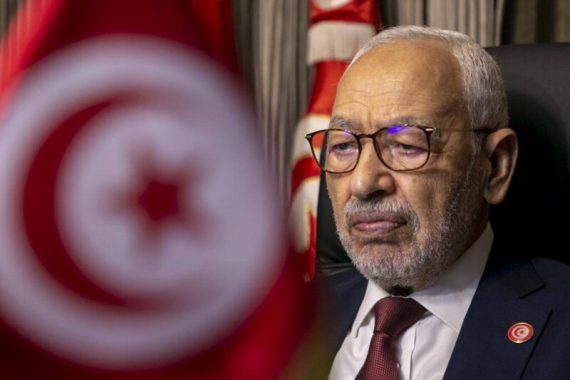W
hen Kais Saied won the landslide elections in Tunisia in 2019, he began to pressure parliament into ceding executive powers that the 2014 constitution had stripped the Presidency of. The constitution made parliament supreme in the country as opposed to the Presidency. Yet, Saied was adamant that he should be the one to appoint his own prime minister and government and should be allowed to rule directly. The elected parliament, in which Rachid Ghannouchi’s Ennahda party were the largest bloc, refused to cede these executive powers and proceeded to try to establish a working majority coalition in parliament that would back a coalition government.
However, Ennahda struggled to form a government and was met with resistance from other parties in parliament such as Tayyar al-Dimoqrati who sought to capitalize on the tension between Saied and Ennahda to demand the interior ministry post. Ennahda’s proposed candidate Habib al-Jimli failed to form a government. As the month designated by the constitution to form a government was approaching its end, Saied and his allies began to threaten to use the constitutional power of calling early elections that would be afforded to Saied after the designated month to form a government had come to an end.
The parties within parliament panicked at the prospect of facing a hostile electorate again and abandoned their polarized positions to come together to form a compromise government. Saied’s preferred candidate for Prime Minister would be accepted, however, the government would be divided between the parties in parliament. Ilyas al-Fakh Fakh was appointed prime minister.
Al-Fakh Fakh, however, did not last long, and was soon accused of corruption. His position became untenable and Ghannouchi moved to reassert the primacy of parliament by mobilizing a vote of no confidence which was read out by a member of Tunisia’s Parliament Issam Bargougui from the Popular Will party. Saied summoned al-Fakh Fakh to the palace on the same day the no confidence motion was read out, and it was announced at the end of the meeting that al-Fakh Fakh had tendered his resignation.
A constitutional debate
This triggered a constitutional debate. If al-Fakh Fakh was removed by a vote of no confidence, then the constitution stipulated that parliament had to present the next candidate. If al-Fakh Fakh resigned, however, the constitution stipulated that the president would appoint the next prime minister. A debate ensued as to whether the no-confidence motion had been submitted first, or the resignation.
In the end, Ennahda ceded to Saied again in order not to fuel further antagonism towards parliament from a hostile population, and Saied appointed his own prime minister Hichem al-Mishishi over which Saied was able to exert much more control.
However, Mishishi soon switched allegiances and began to work more closely with Ghannouchi and Parliament. Mishishi then sacked some of Saied’s loyalists, including the interior minister, and assumed the latter’s position himself alongside his role as Prime Minister. Saied raged at this ‘betrayal’, and it is within this context that he subsequently moved to seize all power, suspended parliament, and suspended the constitution.
Legitimacy struggle
However, Saied has always struggled with the matter of legitimacy. Although he won a landslide in 2019, the vote was more an emphatic rejection of his opponent Nabil al-Karoui than it was an indication of any support for Saied (who had secured less than 20% of the vote in the first round). More importantly, legal experts denounced his interpretation of Article 80 of the constitution which allows emergency rule, but only on the condition that parliament remains in ‘continuous session’ throughout and that emergency rule cannot be extended without consulting the Speaker of parliament; in this case, Ghannouchi.
To address this issue of ‘legitimacy’, Saied sought to discredit the legitimacy of parliament by dragging political opponents before the courts on charges of fraud, money laundering, and terrorism, in the hope of securing guilty verdicts by which he could then declare that the elected parliament was illegitimate. However, most judges refused to deliver the verdicts Saied wanted. Ghannouchi was released over and over again as judges cited lack of any credible evidence and refused to order his imprisonment, as were a number of other opponents. Saied then turned to the military courts in an attempt to secure verdicts, despite the military courts having no jurisdiction over civilians.
With months passing and Saied failing to convict enough members of parliament to boost the ‘legitimacy’ of his coup, Saied moved to dissolve the High Judicial Council and create a new judicial body comprising of loyalists. Yet still, he struggled to secure the verdicts he ‘needed’ to obliterate the legitimacy of the elected parliament.
Then, in March 2022, the suspended parliament convened online with a quorum to vote to remove Saied’s emergency powers. The legal ramifications of this move were such that Saied immediately scrambled to announce the dissolution of parliament. In other words, Saied still believed the parliament had enough legitimacy to force a challenge to his coup, and therefore rushed to crush it.
Saied then quickly moved to unilaterally write a new election law, a new constitution, and proceeded to hold a referendum.
Low turnout
However, the turnout for both his referendum and his subsequent ‘elections’ later in the year were abysmally low. The elections in particular saw less than 12% turn out to vote, and almost set a record for the worst-attended election in the history of global democracy. Neither the referendum nor the elections could credibly reinforce the ‘legitimacy’ of his coup internationally and domestically.
The humiliation was not lost on Saied’s supporters, who once again insisted that Saied’s failure to convict the democratically elected Speaker of Parliament Rached Ghannouchi and Saied’s failure to dissolve the most successful democratically elected party in the country would continue to undermine his coup. In other words, the continued freedom of the democratically elected leadership of the largest democratically elected bloc would continue to present a stumbling bloc towards any bid by the coup to establish ‘credible legitimacy’.
The turning point, however, was the notable shift in the stance of Washington which welcomed Saied’s ‘elections’ as a “essential initial step toward restoring the country’s democratic trajectory”. A jubilant Saied immediately moved to arrest former Prime Minister Ali Laareydh (who remains in prison to this day). Noureddine Bheiri, a former justice minister, was detained. The democratically elected member of parliament for the city of Kairouan Sayyed Ferjani was imprisoned.
The sudden surge in arrests and detentions reflected the growing confidence from Kais Saied that his ‘legitimacy’ was being recognized internationally. Italy’s Prime Minister Giorgia Meloni publicly insisted on the need to help Tunisia secure funding, while Qatar sent a delegation to Kais Saied to discuss investments. The sudden turn in fortunes for Saied internationally resulted in a ramping up of his crackdown, to the extent that Saied openly declared that “any judge who finds [his opponents] innocent will be considered a co-conspirator”.
Recommended
Why Saied arrested Ghannouchi
It is in this context that Saied moved to arrest Ghannouchi at the first opportunity. A video emerged of Ghannouchi addressing other opposition activists and asserting that “attempts to eradicate any political trend, whether Islamist, or leftist, or socialist, would threaten to plunge the country into civil war”. Media outlets, that have increasingly aligned with the new power dynamics in Tunisia, gave the video relentless coverage with pundits accusing Ghannouchi of ‘inciting civil war’. Ghannouchi’s house was reportedly stormed, and he was taken away. This time, instead of ordering his release, the judge ordered his detention and imprisonment.
International reactions have been rather muted. The White House took 48 hours to release a statement in which the contents suggested it was more protocol than any suggestion of anger at Saied or support for the democratically elected Speaker of Parliament. Moreover, Saied has received a boost in his resistance to the terms of the IMF loan being negotiated as the powerful trade unions, with whom Saied has been wrestling, announced their firm support for Saied’s rejection of the proposed conditions. The U.S. has also indicated it is prepared to revise the terms of the IMF loan deal.
In other words, the arrest and detention of the democratically elected Speaker of parliament, and leader of the most successful democratically elected party, has been met by the international community with relative silence, and instead, greater cooperation with the coup that has toppled the democratic transition. Even as reports emerge of security forces breaking down the doors of Ghannouchi’s family, and embarking on practices reminiscent of the dictatorships of the Ben Ali and Bourguiba regimes, the suggestion is that the international community remains undeterred in its current course of working with the coup.
Saied hopes that now he will finally be able to secure the verdict he has long sought against Ghannouchi. The exact charge of conviction is irrelevant. Saied simply hopes to assert to the Tunisian population and the world that the parliament he suspended and then dissolved was ‘illegitimate’ because the democratically elected Speaker was a ‘criminal’ who should never have been elected. Saied will hope that the conviction of Ghannouchi will finally secure international ‘legitimacy’ and ‘recognition’ for his coup against Tunisia’s democratic transition.





